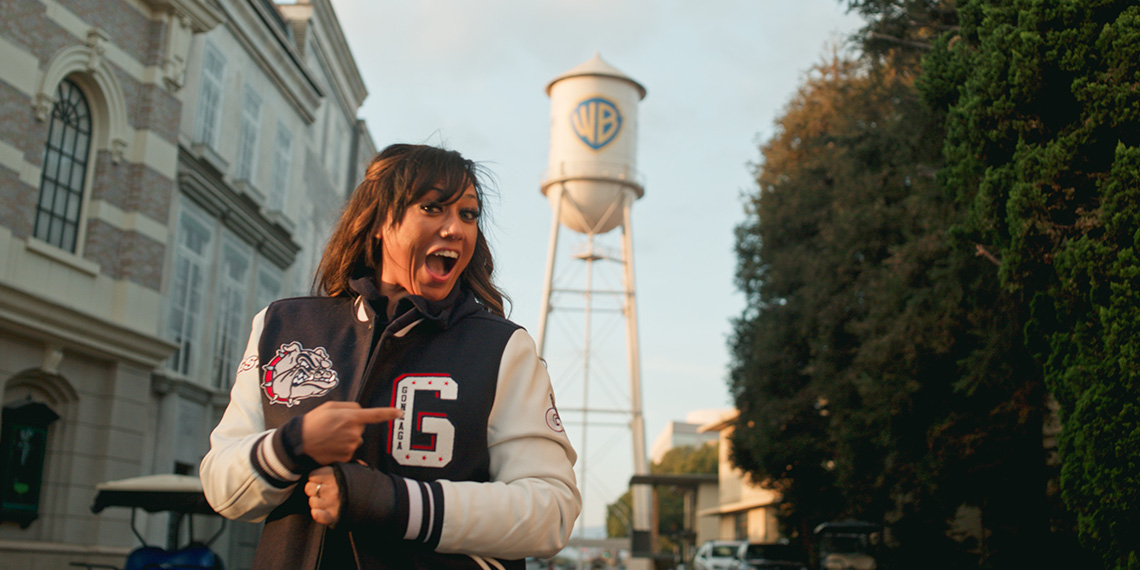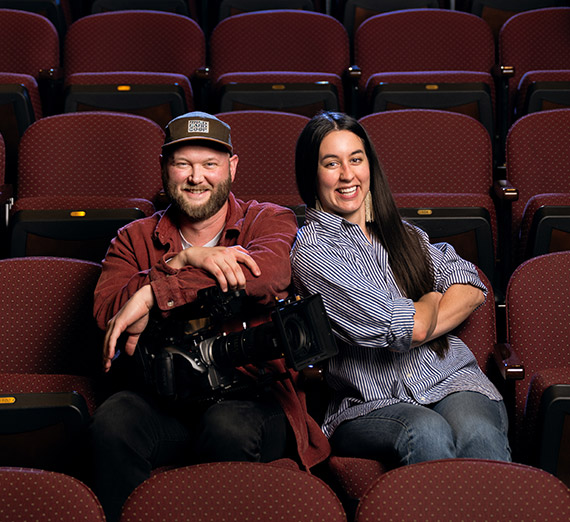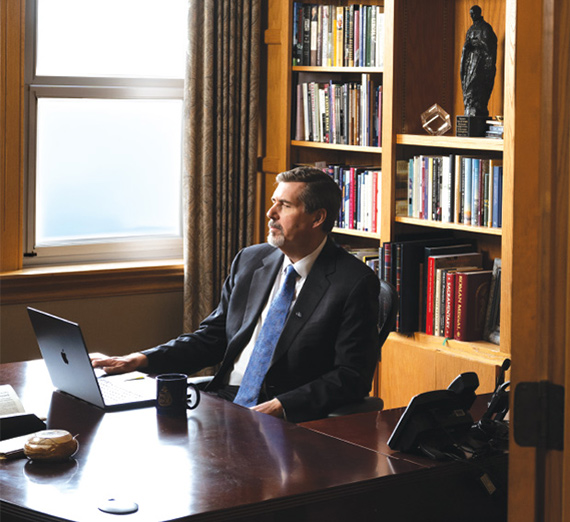Once Upon a Time in Hollywood
The relentless drive of Mandi Price ('14) is making showbiz dreams come true

It doesn’t take Mandi Price long to name the favorite part of her job as a Hollywood producer.
It’s not hanging out with celebrities (although that’s pretty cool) or attending high-profile award shows (especially when she wins an Emmy!). It’s the moment after her team has put the finishing touches on a project and she sits in a darkened theater to experience an audience seeing a production for the first time.
“It’s really something special to watch an audience watching what you’ve spent so much time and love and care on,” says Price, a Gonzaga political science and broadcast journalism graduate who fondly recalled just such an experience this spring at a screening of "Becoming King," a documentary she produced about actor David Oyelowo’s transformation into Martin Luther King Jr. for the film “Selma.”
“All the days you don’t sleep, all the hours, all the hustle and bustle, the deadlines – it’s all for this moment. You hear people laugh, you hear them cry, you hear them gasp, and you’re like ‘This is why I do it.’ ”
Teamwork Makes the Dream Work
It’s no secret that behind the glamour of Hollywood there are armies of people working to turn ideas on a page into the movie and television magic that fills our screens.
Without editors, music composers, hair stylists, makeup artists, special effects experts and myriad others, Hollywood is just a smoggy SoCal neighborhood awaiting the next earthquake. With those people – all peers of Price in her role leading post-production primarily on TV series – Hollywood is still Tinseltown, where dreams come true on screen and in the real lives of those who make it in the entertainment business.
Price is very much one of those people making it. In just a few short years, she’s been a producer on award-winning series like "Daisy Jones and the Six" and "Little Fires Everywhere," worked with Hollywood heavyweights like Reese Witherspoon and Seth Rogen, and forged a uniquely expansive role in an industry that is notoriously difficult to break into.
Years ago, “post-production” was considered just the editing stage of a show. But in modern television, it’s so much more. As Price describes it, because shows have become so big and cinematic, her role now includes working with everything from special effects to music composition, color science, directing to, yes, editing.
“My job is to make the script come to life,” Price says. “I get to be involved pretty much from the beginning to the end. I’m one of the early hires on a show, often the second person hired after the head writer. The show runner is usually the head writer, and I get to be like the best friend of the show runner.
“I do hire editors, that’s part of it, but also sound and color, all the physical aspects. I’m one of the few people who talks to every single department. I feel so lucky. And my department, we’re the last ones to see the show before it airs. We deliver it directly to the studio and to the network. I’m talking with studio execs, network execs, I write schedules and calendars. It’s a big job.”
The Road to La La Land
A Hollywood career wasn’t necessarily one of Price’s dreams when she was growing up in Spokane. Neither was attending Gonzaga. When she graduated from Shadle Park High School she attended Southern Virginia University on a golf scholarship, fulfilling an ambition she’d had to go to college on the East Coast.
Soon enough, though, Price’s eyes turned back to Spokane and a desire to get into broadcast journalism at Gonzaga.
In GU’s program, “You’re making TV on day one, year one,” Price says. “I didn’t want to learn just the theory of TV, and I didn’t want to learn from a book. I wanted to learn how to do it, and GU provided that. I knew I could get a well-rounded education, that’s exactly what I wanted. Gonzaga was the best thing that ever happened to me.”
She landed a job with Spokane’s KHQ-TV while still a junior, and eventually became lead video editor of the morning show. It didn’t take long to realize that staying in journalism, especially off-camera and behind the scenes, would be a challenge – especially for someone with serious student loans.
Price had an inkling that she might like to take her production skills to Los Angeles, but she had no connections, no real knowledge of how the entertainment industry worked. “I had to kind of maneuver and get scrappy about how I do this.”
That meant quitting her TV job and getting a gig at Delta Airlines so she could take free flights to LA to meet industry insiders. How did she find those people? Scanning the credits of shows and movies she watched, and reaching out to them via social media, sending them samples of her work and asking them out for coffee.
“It took about a year and a half of that persistence, probably over 1,000 emails, and finally someone was like, ‘Well, I have a post-production assistant job for you if you’d like it,’ ” Price says. “Two weeks later, I was down in L.A. It was crazy.”
Price credits the skills learned at Gonzaga making video packages and the basics of storytelling with leading her to the award-winning shows and creatively satisfying jobs she does today. “It provided everything I needed, and continues to do so,” she says.
Price is in Spokane often enough – speaking to classes, engaging with the Spokane Black community, even taking in basketball games as a season-ticket holder – that one might think she still lives in her hometown. She loves being an active part of the Gonzaga community, whether in Spokane or her adopted home of Los Angeles.
“The Gonzaga culture is very much rooted in giving back, and I feel it’s such a privilege that anyone would even ask me to attempt to give back, I’m happy to do it,” Price says. “Gonzaga provided a life for me that I didn’t even know existed."
"I want L.A. to be full of Zags," she says.
She embraces the idea of Zags helping Zags in getting into show business. She knows how challenging it can be to get that first break, and no doubt the odds are even greater for other young Black women in an industry still dominated by white men.
Price is just one of 10 Black post producers in all of Hollywood. Just four of those 10 are women, and most work in reality TV.
“I’m often the only Black woman in the room” on any given project, Price says. “My job now is to bring up others. Working for [Reese Witherspoon’s company] Hello Sunshine and for Seth Rogen and Evan Goldberg’s production company Point Grey changed my career and gives me the opportunity to be able to shine a light on other minorities. It’s hard to find minorities for projects – and we’re here, we’re around – because we have not received the exposure or the opportunity to work on high-profile shows.
“I’ve really strived to make that part of my job. If I have any influence to make it so I’m not the only one and bring others up with me, I’m doing that. I feel grateful to get to do that.”
Share your thoughts on Mandi's story! Reach out to the editor.
- Alumni
- Arts & Culture
- Careers & Outcomes
- Diversity & Inclusion
- College of Arts & Sciences
- Academic Vice President
- Alumni
- Broadcast Studies
- Journalism
- Gonzaga Magazine






